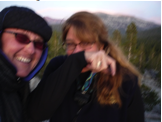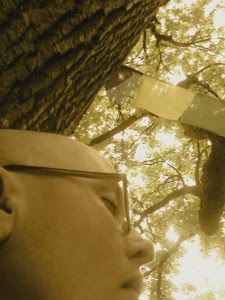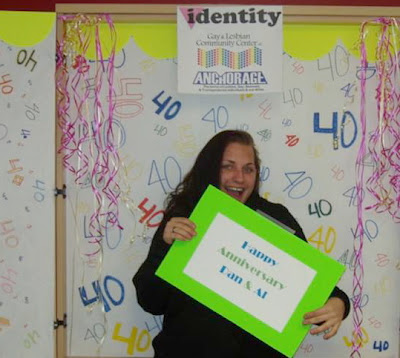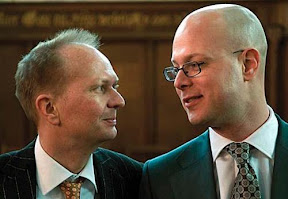Articles in Where Are They Now?
Queer, Christian, and raised in a Yupik Village

Julia McCarthy grew up Catholic in a Yupik village. She graduated from the University of Alaska Fairbanks, worked in Anchorage for a few years, and now lives in Maine with her partner. She wrote this essay about her journey as a queer person of faith on October 30, a few days before the religious conservatives of Maine voted to repeal the state’s new same-sex marriage law.
* * *
How does that slogan go? I’m queer and I go to church – get used to it
I am a person who tries to practice my faith daily. I am a queer person who believes that we can experience mysteries that defy explanation in our daily life. I am a person who regularly attends church and believes that there are many, many paths to understanding ourselves and our relationship with the unknown. I am a person who loves math and science and logic and believes that we gain wisdom from knowledge.
My relationship with religion may seem complex to some. It is not a relationship which I choose to be very vocal about, for a variety of reasons. I’ve been inspired to try to share something of my path by the aggression I have seen directed toward a number of young people in our community and by the powerful words of our housemate, who chose to share his perspective. Thank you for reminding me that it’s important to come out in lots and lots of ways.
Spirituality and religion have played transformative roles in my life since I was born. The village culture I grew up in practiced both Catholicism (in Yupik) and a variety of ways of celebrating the worldview of Yupik peoples – dance, singing, mask making, storytelling, honoring the cycles of life. Fellowship with your community and with God was a part of my daily life in the village and imbued almost every task in some way or another. It’s how I learned to respect life, the natural world, responsibility to others, and more. These traditions are not without their challenges – most GLBTQ Yupik people I know have had both cultural and religious barriers to coming out. It was through the lessons I learned in the village that I developed a relationship with god, though, and it’s important to note that the lens through which that relationship developed was guided by the elders I loved and respected.
Throughout the rest of my childhood and into my teens I was a devout Catholic. I attended St. Nicholas Church in my hometown and, as I got older, found as many reasons to be at church as I could. My devotion to my faith set me apart from many of my peers and it was sometimes difficult for me to find community that was accepting of who I aspired to be. For a long time, I thought about becoming a nun – I felt my path to being a helping person was to be found next to God. I was confirmed as an adult in the tradition of that faith, and shortly thereafter chose to leave the Church. When I left Catholicism, I lost many of my friends. More importantly for me at the time, I lost my faith. There were a number of reasons that my relationship with God was damaged and the one reason that created a huge barrier for me in finding another community of faith was my queerness.
I was taught through declamations of supposedly loving people that the god that I had developed a relationship with throughout my life HATED me because I was queer. I learned through the behavior of my community and my peers that to be queer was to be without faith, without support, without dignity. I learned through conversations with other queer people that to adhere to a path of faith was scary and wrong, especially after understanding the damage inflicted upon queer people by communities of faith. I learned to create an armor to deflect the painful phrase “Love the sinner, hate the sin.” I learned to avoid conversations with people that had to do with any kind of spiritual belief system. I learned to hide my questions and to reject my beliefs and to keep my mouth shut so as not to offend anyone. I have watched people be shunned by their communities or live closeted in fear that they will be rejected and ridiculed if they come out. I have lost so many friends to suicide that I cannot keep track any longer. I decided that if there was any kind of higher purpose to life, it completely escaped me.
Then I met Jamez and with him I remembered what a joy it is to explore my faith. To lift up my voice in praise. To listen to a sermon and feel inspired to disagree with my faith leader and thereby learn more about who I am in the process. In this community of faith, I don’t need to make up my mind about anything to know that I have value.
When I think about the people who have been with me to explore my faith, I feel lucky to count among them people from all walks of life and all belief systems. It is not my intention to change your mind about your particular system of belief or non-belief.
I’ll tell you what I do think needs to change though:
I think more queer people need to feel safe coming out as people of faith.
I think people who are queer allies and practice any kind of religion need to feel like they can express dissent without becoming isolated.
I think people of faith who are NOT allies to GLBTQ people need to stop choosing to abuse their fellow humans with words and looks and actions.
We are complex beings, with beautiful multi-faceted identities. I want to see more love in the world, and if I can’t see that, I want to see more respect for one another.
KK editor, former ADN writer seeks Queer Alaska stories


Happy 40th Anniversary, Dan & Al

Lucy Frey Inducted into Alaska Women’s Hall of Fame

Lucy Frey, a founder of Alaska’s lesbian community, was inducted into the Alaska Women’s Hall of Fame on March 6 as a member of the inaugural class. Frey is honored as a “social studies educator [and] feminist leader.”
The Hall of Fame inducted 50 women who have made or are making significant contributions to the shaping of Alaska. Seven of the 13 living inductees were present and most are supporters of the lesbian and gay community, according to the Grrlzlist, including Carol Comeau, Dana Fabe, Katie Hurley, Sarah James, Arliss Sturgulewski, Fran Ulmer and Esther Wunnicke.
“I remember Lucy Frey for two things,” wrote Rosemary Shinohara in an ADN editorial Some Teacher.
“She was my most memorable teacher at Clark Junior High. I loved social studies in seventh grade. Getting to stay after to work on the bulletin boards was a big treat. She put up with troublemakers. She furthered a passion for school that carried me through many years. And she often played Scrabble with my mother, a school secretary and die-hard Catholic. I went along for the games.
“I had no idea at the time that Lucy Frey had a life outside Scrabble and classrooms. But last week, she was among 50 women named to the first Alaska Women’s Hall of Fame induction, alongside such notables as Tlingit civil rights leader Elizabeth Peratrovich and Mary Louise Rasmuson of the Rasmuson Foundation.
“Now I find that she was a peace activist, noted Alaska feminist and rabble rouser.
“She handed out pledge cards downtown, asking people to resist violence. She co-owned the Alaska Women’s Bookstore. She helped launch the Alaska Women’s Political Caucus.
“Organizers of the Hall of Fame — a handful of women’s organizations — say many feminist causes originated over potluck dinners in her living room.
“I don’t know how Lucy and my mother became friends — I’ve always thought of my mother as having been a more traditional mom, certainly not someone to hang out with feminists. But I’m glad it happened.
“I always knew Lucy Frey was a special teacher. Now I know she was a special human being too.”
Many LGBT people and our allies knew Lucy and enjoyed the lesbian groups and events she helped to create. Although I moved to Alaska just after she retired to Missouri, I heard much about her, especially the potlucks and the Sing-Along.
What are your thoughts on Lucy Frey’s contributions to Alaska? Share your stories of Lucy in the comments.
Rev. Johnathan’s New Journey: From Anchorage MCC to Edinburgh

It was such a pleasure to see you all again so soon. Now I am back in Edinburgh and have started working at a fast pace. Yesterday (July 20) was my first Sunday back and we celebrated MCC Edinburgh‘s 13th birthday. We had over 40 people in attendance and had a wonderful service.I have recently been reading a Thomas Merton book and there was a fabulous quote in there that I would like to share with you:“Only when we see ourselves in our true human conditions as “one body” will we begin to understand the positive importance not only of the successes but of the failures and accidents in our lives. My successes are not my own. The way to them was prepared by others. The fruit of my labors is not my own: for I am preparing the way for the achievements of another. Nor are my failures my own. They may spring from the failure of another, but they are also compensated for by another’s achievement.” (Thomas Merton, No Man Is An Island)As I read this passage, I was reminded of my time in Anchorage. I thought about my successes with the church and my failures with the church, but this passage made me realize that neither the successes nor the failures were solely my own. WE worked hard as a Church to outreach to the GLBT community of Anchorage. WE worked hard to establish a strong Building Fund account. WE worked hard to build An Inclusive Church. And there is a liberation in knowing that where we failed, we failed together and we learned together.As I now move on another journey with MCC Edinburgh, I will always remember with joy my time with my first church. I will always keep in mind the invaluable lessons I learned during my four years with all of you. In the same manner, there are many things that MCC Anchorage can learn as you grow into your new journey.I will pray for you often, and I will be back in January to visit with you. If you would like to keep in contact with me, I am keeping the same email address.God Bless You.Love,Rev. JohnathanInterim PastorMCC Edinburgh
CowGal Val and Ravenhurst: Lesbian and Gay Bloggers Who Lived in Alaska (But Don’t Now)



No TransAlaska Love for Calpernia Addams

Early morning on April 6th, 1993, when I was still a field combat medic in the Navy and living on a remote Alaskan island (yes, really!), a Chinese airliner encountered some kind of severe turbulence and had to land on the even more remote Alaskan island of Shemya. I was on duty in the emergency room that night, and volunteered to fly the quick hop over to Shemya and start processing the wounded.
We got everyone stabilized, except for one poor soul who died. Later that day, a big plane from the mainland in Alaska arrived with medical teams to medivac the wounded back to Elmendorf Air Force Base hospital. I made the long trip (7 or 8 hours?) from Shemya to Anchorage with my patients, monitoring IV bags and vitals. It was quite a day for all of us on the Adak medical team.
"Rising Star" Director Peter DuBois Honed Skills at Juneau’s Perseverance Theatre

Ben Bohen, his partner of 11 years, will keep their Brooklyn apartment as DuBois sets up another home in Boston for the Huntington job. They plan on commuting, but it won’t be as difficult as when DuBois moved to Alaska to become artistic director of Juneau’s Perseverance Theatre.“Ben finally came out to visit for the month of December,” said DuBois, “which is one of the hardest months to be there, and he said, ‘OK, I’ll make the leap.’ We lived together there for four years before I got the call from the Public.”“Even in Alaska, which is an incredibly conservative state, I actually was very consciously keeping myself out [as a gay man] because it’s a part of my identity that I’m really proud of.”
Before being recruited to the Public, DuBois was artistic director of Perseverance Theatre in Juneau, Alaska. A mid-sized regional company, Perseverance is hailed for distinctive artistic boldness, innovation, and a dedication to its community and its audience. There, DuBois directed revivals of Beckett, Shakespeare, and Chekhov, and introduced modern-day works by Paula Vogel, Suzan-Lori Parks, and others.
In a bold move to the furthermost reaches of the United States, DuBois took over where Perseverance founder Molly Smith had left off. It was at Perseverance that he honed his institution-building skills, cutting debt and raising $2.5 million in capital and endowment campaigns to make Perseverance Alaska’s largest producing arts organization. He also brokered a relationship with the University of Alaska Southeast in which Perseverance would assume responsibility for all theater education activities at the college, offering minors to its students.DuBois ran Perseverance from 1998 to 2003, beginning to make a reputation for himself as an up and coming American artist and institutional leader.
“I’ve developed relationships at the Public and living in Europe and even in Alaska that are relationships that I plan to be bringing to the Huntington Theatre, and I think the programming is going to represent a really diverse range of what theater means.”
Congratulations, Peter!
First Gay Couple Married in San Luis Obispo Met in Alaska

Wedding Bells in the Juneau Empire

Crispian Smith, of Juneau, and Jeroen van Dalen, of Rotterdam, the Netherlands, were married in a ceremony attended by family and friends on March 29, 2008, in the Old Church in Amsterdam.
Mr. van Dalen is the son of Cees van Dalen, of Schiedam, the Netherlands, and Atie and Dick de Zeeuw, of Amsterdam. He received his doctorandus from the University of Maastricht and works as a content management consultant.
Mr. Smith is the son of Phil and Deborah Smith, of Juneau. A graduate of Juneau-Douglas High School, he received his bachelor’s degree from the New School for Social Research in New York City and his master’s from the University of Amsterdam. He is a case manager at the war crimes tribunal in The Hague.
After a brief honeymoon on the Belgian coast, the couple returned to their home in Amsterdam.
























